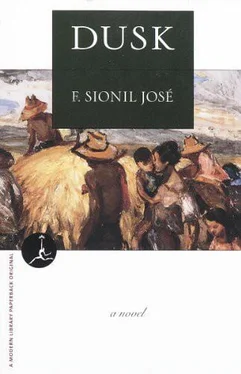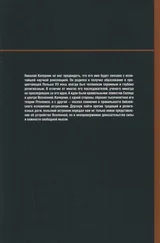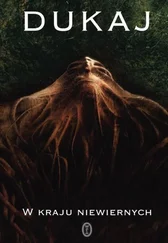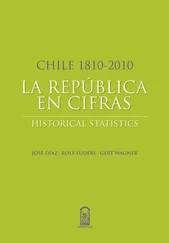He had raced the wind, propelled by a strength that did not flag. He climbed the trail, now shrouded by tall trees, quiet and sepulchral, and dark as men’s minds. What was it that urged him on?
Duty — the thought was emblazoned in his mind, a torch over the trail, food to his stomach, the rich, fresh air in his lungs, and yes, the bone to his tender flesh. Duty, and this meant Dalin as well, his two sons, and oh, my father, I can see you now with your one good arm reaching out, and Mother — you who had prayed that I be able to vault the distance from Po-on to a pinnacle where I could draw you up, where you would no longer know the cares of living.
And remembering them, tears stung his eyes, blurring briefly what was ahead, the brambles that tore at his legs, the huge boulders that blocked his way.
Then someone shouted the familiar ¡Alto! He did not stop; he ran forward instead, shouting: “The Americans! They are coming. With horses. Hundreds of them. The Americans — they are coming!” A commotion ahead, a mad whirl of bodies. Arms seized him, clamped his mouth, pinioned him, bade him keep quiet. Around him figures moved quietly.
They knew who he was, and he was thankful that he had reached them safely. They left him by the side of the trail while a soldier went up toward the pass. He sat quietly, letting the coolness of the mountain seep into his being, quieting down the tremor in his heart. And it was then that a tiredness crept into his limbs, his body, and with it, a heaviness of the eyelids, the diminishing awareness of everything around him, and finally, sleep — deep and dreamless.
He woke up with the whole world grown still; even the insects seemed to have gone to sleep. Then, the sound of digging, low Tagalog voices, brisk commands. Above him, the night arched beautiful and dusted with stars. It had become cold; he missed the familiar warmth of Dalin, the contours of her body, and the smell of their narrow sipi . Dalin — how she had changed through the years, from the headstrong woman that she was when they first met, into this wife and mother who knew how to persevere, to wait for the good times that might never come.
His mind remained sharp; it encompassed in one sweep again how it was in Po-on, those seemingly wasted years in the convent in Cabugaw. If he were there still, perhaps at this time he would still be reading, or writing, putting into pompous words the thoughts that came: he was so presumptuous then. Now, he was no longer afflicted with verbosity; he had discipline, detachment, maturity.
A soldier approached him.
“Yes,” he mumbled, “I am rested now.”
In a while, another soldier came with a cup. It was hot coffee sweetened with cane sugar, and it warmed his insides quickly. Then another came with a plate; he could see the pieces of dried meat, the white chunks of rice. He ate gladly, thankfully.
The air smelled so clean, spiced with the scent of grass. The crickets came alive again and they filled the night with their music. Thoughts of his boys crowded his mind. And Dalin most of all, the sound of her voice calling him Old Man. What was he doing up here, on this lonely roof of the Ilokos?
A soldier jarred him from his reverie. The general wanted to see him. He rose and followed him to the dark turn of the trail, and there the general sat, reclining against a boulder.
“Good evening, Apo,” Istak said.
“You came back to tell us the news, Eustaquio,” the general said quietly. “Have you rested?”
“Yes, Apo,” he said. “I am grateful.”
“Do you know how many they are? Surely a thousand.”
“I did not count, Señor General. I couldn’t go near — I was afraid—” He paused. That was the truth, he had been afraid. “They were in a very long line. With many horses. More than a hundred. Maybe three.”
“Sleep now,” the general said after a while. “We have plenty of work when it is light.”
The stone upon which he rested his head was hard, and the grass pierced the blanket in places and pricked his arms, his legs, but sleep did come again, this time fitfully.
He woke up long before daybreak, birdcalls echoing from the forested slopes below them. In the first flush of light he viewed the sweep of mountain and sky, the summit grassy in places. He knew the turns of the pass very well; every year he and Padre Jose, old, portly — beads of sweat on his ruddy face and even on the smooth dome of his bald head — had taken this route on the way to the village of Angaki and the other Igorot settlements beyond.
All around, these young Tagalogs barely out of puberty, the milk of their mothers not yet dry on their lips, pausing in their labor, appraising the earthwork they had made on sections of the pass. Among them, he felt old and tattered in spirit. He was not equal to them in strength, but he knew this land better than any of them, the secret crevices of these mountains, the labyrinthine ways to the valley — and the Igorot villagers that might attack them. He could lead them to wherever they wanted to go. This was, after all, what he was here for. And if it was their decision to make a stand here, they could do it better with ambushes farther down. They should also secure the mountainside at the right, for there was a steep trail there which overlooked the pass.
He turned again to the young men around him, sardonic indifference on their faces. It was not only their youth which saddened him — it was the casualness with which they waited in their trenches. Would these also be their graves? How many funerals had he attended, how many open graves had he seen, watched the coffins cased down, or sometimes just a frayed mat in which the corpse was bundled, the feet sticking out, the soles white and sometimes still specked with dirt if the man had been a farmer and could not afford slippers, let alone shoes. He wanted to strangle the thought but he saw with horror that, indeed, many of the soldiers were barefoot like him. They were farmers, too, but they were all Tagalogs; they would not trust him, they would not want him by their side when the hour came.
The wind swooped down bringing with it again the scent of grass and earth. It was harvesttime in the plains below, in Cabugawan as well. In his mind’s eye, his boys were romping around, trying to help although they could do but little, trailing behind their mother to see if she had missed any stalk with her hand sickle. There would be nothing missed, of course, and in a week the field would be bare and the sheaves would be laid out, spread like flowers to dry in the sun before they were neatly piled in the granary behind their house. How wonderful it was — the smell, the taste of new rice, the steam rising from it, even with just a dash of salted fish and lemon.
Istak did not speak with the soldiers. He doubted if any could speak Spanish. In fact, they could be wondering how it was possible for a farmer like him to know the language of their former rulers. He was much older, too, and he realized with some discomfort that he was not young anymore.
Morning rode over the hills, gleaming on the narrow valleys below, shimmering on the trees, its song of praise reflected on the shale and on the smooth surfaces of red rock. It came to him with a sudden twinge of remembrance that it was Saturday and if he were in Cabugaw now, he would be about through with the offertory of the morning Mass. He must not think about that, he was here in the splendor of morning, the hillsides burnished with light. If only this would last!
From around the curve of the pass above, the general appeared on his white horse. He came down at a slow canter, his spurs reflecting bits of sun. He was handsome — Istak saw that; no wonder then that the women in Pangasinan and wherever he went had swooned over him. He had a yellow scarf about his neck, and though they had climbed trails and muddy gullies, his rayadillo uniform was clean and his boots neatly polished. He was examining the earthworks, pointing out here and there what needed to be done. Their positions gave them a clear sweep of the terrain below.
Читать дальше












